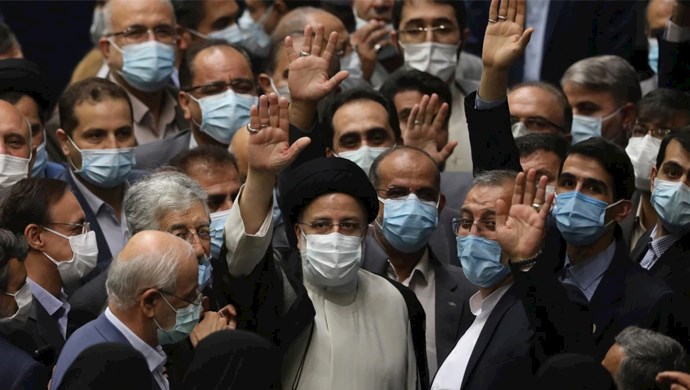Analysis by PMOI/MEK
Iran, November 6, 2021—While the lives of Iranian people continue to spiral into poverty, officials and ruling factions continue to quarrel over looting national wealth and grabbing a bigger share of government power. And in these constant rivalries, they are favoring their families and inner circles to fill key posts instead of providing opportunities to the people who are qualified for the jobs.
"Mrs. Zeinab Kadkhoda is cousin of [regime president] Ebrahim Raisi's wife, and it was revealed yesterday that she is the head of the dental school of Shahid Beheshti University… This problem is plaguing all government institutions and entities from the parliament to the municipality and so on. There are so many cases and instances that it is no longer easy to list them," the Jahanesanat daily reported on November 3.
Many officials are appointed to many ministries, governorates, and other high-ranking government positions simply because they actively contributed to the regime’s suppression of protesters and dissidents.
This action shows that the meaning of meritocracy in Iranian regime’s culture is to participate more and more in crime and repression against the people.
The list of cabinet members appointed to Raisi’s government and provincial governors is filled with people linked to Revolutionary Guards, veteran regime officials, and loyalists to regime supreme leader Ali Khamenei.
Regarding nepotism, the state-run newspaper Mardomsalari ran a piece that reads in part: "From son in law to niece, there are daily news of new appointments that show some of the relatives of famous people and officials are happy these days and are receiving new government positions. This issue has become so common that 'meritocracy' seems to be 'Familyism (Nepotism)' among this political faction, and people are just beginning to understand its true meaning."
Other than the above mentioned, another indicator considered for government positions is the ability of the candidates to fill the regime’s coffers with ill-gotten money stolen from people.
In comments to the state-run daily Keyhan on November 3, Hojatollah Abdolmaleki, the Minister of Cooperatives, Labour, and Social Welfare, accused the heads of the previous government in the Ministry of Labor to various security and economic crimes and said, "Some of them were people who were involved in all kinds of corruption cases, including economic corruption, and some of them were people who had all kinds of convictions and crimes, such as security and economic crimes.”
Referring to the corruption of the former Deputy Minister of Industry, Mine and Trade, who was arrested by the IRGC, Mardomsalari wrote on November 3, "The former deputy minister of Industry, Mine and Trade and the network of brokers linked to him, who played a major role in the inflammation of the oil market and the shortage of this basic commodity in 2020, were arrested by the IRGC intelligence service. This government official is accused of receiving bribes, allocated the preferential exchange rate of 42,000 rials per U.S. dollar related to the import of oil to a private company (the free-market exchange rates of the U.S. dollar is 280,000 rials). Not only did he not use the currency to import oil, but he also sold part of the country's strategic oil reserves illegally.”
Corruption and looting in the Food and Drug Administration of the Ministry of Health is also one of the cases acknowledged by government officials.
The state-run Aftab-e Yazd quoted former Minister of Cooperatives, Labor and Social Welfare and Second Deputy Speaker of Parliament, Abdolreza Mesri, in October and wrote, “The FDA is not at all interested in eliminating rents because of a conflict of interest. With documents, I can announce that one of the former managers of the Ministry of Health and the Food and Drug Administration owns 16 pharmaceutical companies and is the importer of medicine and at the same time the CEO of a state-owned company. At the same time, this person imports medicines through his private company and buys these medicines from his own private company at 1,050 times the price through the state-owned company of which he is the CEO. Of course, there are many such examples."
The fact is that cases of corruption and looting of the Iranian people’s property, as well as nepotism and comradeship in government positions are common. They are not limited to one administration and have become a common denominator of all administrations.
"This wrong culture, which does not belong to a particular government, and has dominated appointments in significant sectors of the Islamic Republic for many years, is the source of many corruptions and deviations. We should not deceive ourselves and look beyond our own functionality to find factors or corruption,” the state-run Jomhouri-e Eslami daily wrote on November 3.
Indeed, in the corrupt mullahs’ regime, nepotism and everything related to it is institutionalized. In other words, corruption and repression is an issue that has linked the leaders and regime’s official and keeps them together.
This is what meritocracy means under the rules of the mullahs, where Khamenei and institutions linked to him are sitting at the top and continue to loot the country’s wealth.
And it is this corrupt nature of the regime that is backfiring against it, manifested by continued protests across the country by all walks of life.





